They call'd him the Crimson Parson, the Rev'rend Chivington
Hist'ry don't recommend him for the trouble he begun
"Kill and scalp all Indians big and little" was his cry
"Nets make lice, kill the babies, too, let ev'ry Indian die!"
Oh, the Rev'rend Colonel Chivington with his bible by his side
Oh, the Rev'rend Colonel Chivington he took a bloody ride
And when he'd done his ridin' from Hell's belly hat was
Oh the Rev’rend Colonel Chivington started up a mighty war.
In the valley of the Sand Creeks lived a peaceful dreaming tribe
Chivington knew them for peaceful, but glory was his pride
In the middle of the night he fell upon the place
300 Indians died at once a victory in disgrace.
15 were warriors, the rest woman and child
They scalped and massacred them all, Colonel Chivington went wild
The Arapaho and the Cheyenne, they'd been talking peace
Died that night at Sand Creek, so they would not increase.
Oh, the Rev'rend Colonel Chivington with his bible by his side
Oh, the Rev'rend Colonel Chivington he took a bloody ride
And when he'd done his ridin' from Hell's belly hat was
Oh the Rev’rend Colonel Chivington started up a mighty war.
(Spoken)
Broken, bad hurt and outraged, North the survivors marched
Picking up recruits as they went for revenge their throats were parched
They cut the overland stage route, struck down the telegraph poles
They killed more whites than Chivington reds and they took an unbibled toll
(Sung)
All the way up to Sitting Bull they told their bloody tale
And warpaths smoked as they hadn’t smoked since they cut the Oregon Trail
Indian war for just 12 years scattered all about the land
And the Reverend Colonel Chivington did it all with his little band.
Oh, the Rev'rend Colonel Chivington with his bible by his side
Oh, the Rev'rend Colonel Chivington he took a bloody ride
And when he'd done his ridin' from Hell's belly hat was
Oh the Rev’rend Colonel Chivington started up a mighty war.
Hist'ry don't recommend him for the trouble he begun
"Kill and scalp all Indians big and little" was his cry
"Nets make lice, kill the babies, too, let ev'ry Indian die!"
Oh, the Rev'rend Colonel Chivington with his bible by his side
Oh, the Rev'rend Colonel Chivington he took a bloody ride
And when he'd done his ridin' from Hell's belly hat was
Oh the Rev’rend Colonel Chivington started up a mighty war.
In the valley of the Sand Creeks lived a peaceful dreaming tribe
Chivington knew them for peaceful, but glory was his pride
In the middle of the night he fell upon the place
300 Indians died at once a victory in disgrace.
15 were warriors, the rest woman and child
They scalped and massacred them all, Colonel Chivington went wild
The Arapaho and the Cheyenne, they'd been talking peace
Died that night at Sand Creek, so they would not increase.
Oh, the Rev'rend Colonel Chivington with his bible by his side
Oh, the Rev'rend Colonel Chivington he took a bloody ride
And when he'd done his ridin' from Hell's belly hat was
Oh the Rev’rend Colonel Chivington started up a mighty war.
(Spoken)
Broken, bad hurt and outraged, North the survivors marched
Picking up recruits as they went for revenge their throats were parched
They cut the overland stage route, struck down the telegraph poles
They killed more whites than Chivington reds and they took an unbibled toll
(Sung)
All the way up to Sitting Bull they told their bloody tale
And warpaths smoked as they hadn’t smoked since they cut the Oregon Trail
Indian war for just 12 years scattered all about the land
And the Reverend Colonel Chivington did it all with his little band.
Oh, the Rev'rend Colonel Chivington with his bible by his side
Oh, the Rev'rend Colonel Chivington he took a bloody ride
And when he'd done his ridin' from Hell's belly hat was
Oh the Rev’rend Colonel Chivington started up a mighty war.
inviata da Alessandro - 5/10/2009 - 15:16
La lettera che segue fu scritta dal Capitano Silas Soule, presente agli accadimenti di Sand Creek il 29 novembre del 1864. Soule fu assassinato a Denver solo pochi mesi dopo, nell'aprile del 1865, perchè si era rifiutato di massacrare donne e bambini inermi ed aveva testimoniato contro il responsabile della strage, il colonnello Chivington
Silas Soule
December 14, 1864
Letter to Edward Wynkoop
Dear Ned,
Two days after you left here the 3d Reg’t with a Battalion of the 1st arrived here. They then declared their intention to massacre the friendly Indians camped on Sand Creek. As soon as I knew … I was indignant … and told them that any man who would take part in the murders, knowing the circumstances as we did, was a low lived cowardly son of a bitch. Chivington and all hands swore they would hang me before they moved camp, but I stuck it out, and all the officers at the Post, except Anthony backed me.
I was then ordered with my whole company to Major A with 20 days rations. I told him that I would not take part in their intended murder, but if they were going after the Sioux, Kiowa’s or any fighting Indians, I would go as far as any of them. They said that was what they were going for, and I joined them. We arrived at Black Kettles and Left Hand’s Camp at day light.
Anthony then approached to within one hundred yards and commenced firing. I refused to fire and swore that none but a coward would. for by this time hundreds of women and children were coming towards us and getting on their knees for mercy. Anthony shouted, “Kill the sons of bitches”. When the Indians found that there was no hope for them they went for the Creek, and buried themselves in the Sand and got under the banks and some of the bucks got their Bows and a few rifles and defended themselves as well as they could.
By this time there was no organization among our troops, they were a perfect mob every man on his own hook. My Co. was the only one that kept their formation, and we did not fire a shot. The massacre lasted six or eight hours, and a good many Indians escaped. I tell you Ned it was hard to see little children on their knees have their brains beat out by men professing to be civilized. One squaw was wounded and a fellow took a hatchet to finish her, she held her arms up to defend her, and he cut one arm off, and held the other with one hand and dashed the hatchet through her brain.
One Squaw with her two children, were on their knees, begging for their lives of a dozen soldiers, within ten feet of them all firing – when one succeeded in hitting the squaw in the thigh, when she took a knife and cut the throats of both children, and then killed herself. One old Squaw hung herself in the lodge — there was not enough room for her to hang and she held up her knees and choked herself to death. Some tried to escape on the Prairie, but most of them were run down by horsemen.
I saw two Indians hold one of anothers hands, chased until they were exhausted, when they kneeled down, and clasped each other around the neck and were both shot together. They were all scalped, and as high as half a dozen taken from one head. They were all horribly mutilated. One woman was cut open and a child taken out of her, and scalped.
White Antelope, War Bonnet and a member of others had Ears and Privates cut off. Squaws snatches were cut out for trophies. You would think it impossible for white men to butcher and mutilate human beings as they did there, but every word I have told you is the truth, which they do not deny.
I expect we will have a hell of a time with Indians this winter. We have (200) men at the Post – Anthony in command. I think he will be dismissed when the facts are known in Washington. Give my regards to any friends you come across, and write as soon as possible.
Yours, SS
(signed) S.S. Soule
December 14, 1864
Letter to Edward Wynkoop
Dear Ned,
Two days after you left here the 3d Reg’t with a Battalion of the 1st arrived here. They then declared their intention to massacre the friendly Indians camped on Sand Creek. As soon as I knew … I was indignant … and told them that any man who would take part in the murders, knowing the circumstances as we did, was a low lived cowardly son of a bitch. Chivington and all hands swore they would hang me before they moved camp, but I stuck it out, and all the officers at the Post, except Anthony backed me.
I was then ordered with my whole company to Major A with 20 days rations. I told him that I would not take part in their intended murder, but if they were going after the Sioux, Kiowa’s or any fighting Indians, I would go as far as any of them. They said that was what they were going for, and I joined them. We arrived at Black Kettles and Left Hand’s Camp at day light.
Anthony then approached to within one hundred yards and commenced firing. I refused to fire and swore that none but a coward would. for by this time hundreds of women and children were coming towards us and getting on their knees for mercy. Anthony shouted, “Kill the sons of bitches”. When the Indians found that there was no hope for them they went for the Creek, and buried themselves in the Sand and got under the banks and some of the bucks got their Bows and a few rifles and defended themselves as well as they could.
By this time there was no organization among our troops, they were a perfect mob every man on his own hook. My Co. was the only one that kept their formation, and we did not fire a shot. The massacre lasted six or eight hours, and a good many Indians escaped. I tell you Ned it was hard to see little children on their knees have their brains beat out by men professing to be civilized. One squaw was wounded and a fellow took a hatchet to finish her, she held her arms up to defend her, and he cut one arm off, and held the other with one hand and dashed the hatchet through her brain.
One Squaw with her two children, were on their knees, begging for their lives of a dozen soldiers, within ten feet of them all firing – when one succeeded in hitting the squaw in the thigh, when she took a knife and cut the throats of both children, and then killed herself. One old Squaw hung herself in the lodge — there was not enough room for her to hang and she held up her knees and choked herself to death. Some tried to escape on the Prairie, but most of them were run down by horsemen.
I saw two Indians hold one of anothers hands, chased until they were exhausted, when they kneeled down, and clasped each other around the neck and were both shot together. They were all scalped, and as high as half a dozen taken from one head. They were all horribly mutilated. One woman was cut open and a child taken out of her, and scalped.
White Antelope, War Bonnet and a member of others had Ears and Privates cut off. Squaws snatches were cut out for trophies. You would think it impossible for white men to butcher and mutilate human beings as they did there, but every word I have told you is the truth, which they do not deny.
I expect we will have a hell of a time with Indians this winter. We have (200) men at the Post – Anthony in command. I think he will be dismissed when the facts are known in Washington. Give my regards to any friends you come across, and write as soon as possible.
Yours, SS
(signed) S.S. Soule
Alessandro - 5/10/2009 - 17:37
Ma il massacro di Sand Creek, tanto nelle sue modalità che nei suoi interpreti, non vi ricorda il massacro di My Lay, 100 anni dopo? Allora è vero, purtroppo, che la storia si ripete...
Alessandro - 5/10/2009 - 20:28
Letter by Silas Soule to Walt Whitman
February 12, 1865.
To: Walter Whitman,
Paymaster Office
Washington City
Dear Walt,
The Cheyennes didn't get their lands. Or food. Or justice. What they got was slaughtered. Last November 29th the governor sent out Colonel Chivington and a regiment of Hundred Daysers just to kill the ones that camped under our protection at Sandy Creek. Along the way they managed to surround Fort Lyons, dragoon the Colorado First and me. The colonel cried for vengeance, said he'd string up any son-of-a-bitch who'd bury their bodies or their bones, quote unquote. It wasn't an army, it was a mob. I flat refused to order any of my men or open fire. I soon found out what's underneath that hide of Christian love. The colonel-preacher went at me like I was 666 itself. But I stuck fast; two days I testified before an Army board, the colonel shouting challenges, the works. I thought of you, and not without a smile. I mean, here I am a soldier hectored by a colonel just because I wouldn't fight. A preacher, who wanted to kill the innocent, up against an infidel who wouldn't. What do you make of that? Anyhow, about a half of the population want to kill me. The other half are getting there. But some Episcopals are showing signs of backbone and the Army's on my side. Do I know what Quakers must go through?
Fraternal greetings.
Your friend,
Si
Traduzione italiana di Lorenzo Vantaggiato, trovata qui
LETTERA DI SILAS SOULE A WALT WHITMAN
12 febbraio 1865
A: Walter Whitman
Ufficio Paga
Washington City
Caro Walt,
I Cheyenne non hanno ottenuto le loro terre. O cibo. O giustizia. Quello che hanno ottenuto è di essere massacrati.
Lo scorso 29 novembre il governatore inviò il colonnello Chivington ed un reggimento di Centogiornisti ad uccidere quelli che erano accampati sotto la nostra protezione a Sand Creek. Lungo la strada sono riusciti a circondare Fort Lyons ed a precedere il Primo Colorado e me.
Il colonnello gridava vendetta, e diceva che avrebbe strozzato quei figli di puttana; che avrebbero seppellito i loro corpi e le loro ossa... per citarlo testualmente. Quella non era un'armata, era una squadraccia. Mi sono rifiutato categoricamente di dare ordini a chiunque dei miei uomini di aprire il fuoco. Ho capito ben presto cosa si nasconde sotto quella maschera di amore cristiano.
Il colonnello-predicatore si scagliò contro di me come se fossi l'Anticristo stesso. Ma ho resistito strenuamente; per due giorni ho testimoniato di fronte ad un Consiglio militare, davanti al colonnello che urlava insulti, davanti alle loro azioni.
Ti ho pensato, e non senza un sorriso. Voglio dire, eccomi qua, un soldato ripreso da un colonnello solo perché non ho combattuto. Un predicatore che voleva uccidere degli innocenti, contro un infedele che invece non voleva. Tu che ne pensi?
Comunque, una buona metà della popolazione vuole uccidermi. L'altra metà ci sta pensando. Ma alcuni Episcopali già mostrano di avere spina dorsale , e l'esercito è dalla mia parte. Adesso sì che so come se la passano i Quaccheri!
Saluti fraterni.
Il tuo amico,
Si
February 12, 1865.
To: Walter Whitman,
Paymaster Office
Washington City
Dear Walt,
The Cheyennes didn't get their lands. Or food. Or justice. What they got was slaughtered. Last November 29th the governor sent out Colonel Chivington and a regiment of Hundred Daysers just to kill the ones that camped under our protection at Sandy Creek. Along the way they managed to surround Fort Lyons, dragoon the Colorado First and me. The colonel cried for vengeance, said he'd string up any son-of-a-bitch who'd bury their bodies or their bones, quote unquote. It wasn't an army, it was a mob. I flat refused to order any of my men or open fire. I soon found out what's underneath that hide of Christian love. The colonel-preacher went at me like I was 666 itself. But I stuck fast; two days I testified before an Army board, the colonel shouting challenges, the works. I thought of you, and not without a smile. I mean, here I am a soldier hectored by a colonel just because I wouldn't fight. A preacher, who wanted to kill the innocent, up against an infidel who wouldn't. What do you make of that? Anyhow, about a half of the population want to kill me. The other half are getting there. But some Episcopals are showing signs of backbone and the Army's on my side. Do I know what Quakers must go through?
Fraternal greetings.
Your friend,
Si
Traduzione italiana di Lorenzo Vantaggiato, trovata qui
LETTERA DI SILAS SOULE A WALT WHITMAN
12 febbraio 1865
A: Walter Whitman
Ufficio Paga
Washington City
Caro Walt,
I Cheyenne non hanno ottenuto le loro terre. O cibo. O giustizia. Quello che hanno ottenuto è di essere massacrati.
Lo scorso 29 novembre il governatore inviò il colonnello Chivington ed un reggimento di Centogiornisti ad uccidere quelli che erano accampati sotto la nostra protezione a Sand Creek. Lungo la strada sono riusciti a circondare Fort Lyons ed a precedere il Primo Colorado e me.
Il colonnello gridava vendetta, e diceva che avrebbe strozzato quei figli di puttana; che avrebbero seppellito i loro corpi e le loro ossa... per citarlo testualmente. Quella non era un'armata, era una squadraccia. Mi sono rifiutato categoricamente di dare ordini a chiunque dei miei uomini di aprire il fuoco. Ho capito ben presto cosa si nasconde sotto quella maschera di amore cristiano.
Il colonnello-predicatore si scagliò contro di me come se fossi l'Anticristo stesso. Ma ho resistito strenuamente; per due giorni ho testimoniato di fronte ad un Consiglio militare, davanti al colonnello che urlava insulti, davanti alle loro azioni.
Ti ho pensato, e non senza un sorriso. Voglio dire, eccomi qua, un soldato ripreso da un colonnello solo perché non ho combattuto. Un predicatore che voleva uccidere degli innocenti, contro un infedele che invece non voleva. Tu che ne pensi?
Comunque, una buona metà della popolazione vuole uccidermi. L'altra metà ci sta pensando. Ma alcuni Episcopali già mostrano di avere spina dorsale , e l'esercito è dalla mia parte. Adesso sì che so come se la passano i Quaccheri!
Saluti fraterni.
Il tuo amico,
Si
Bernart Bartleby - 6/8/2015 - 12:09
×
![]()

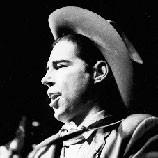
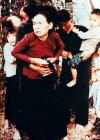

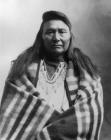
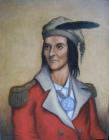
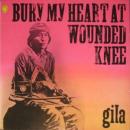
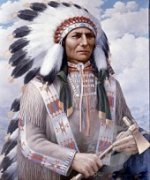
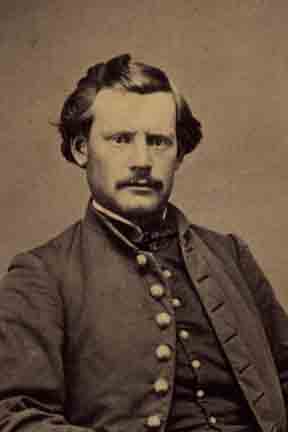
Dall’album “Peter LaFarge on the Warpath”
Testo trovato su qui.
Una versione del brano è stata anche incisa dal singer songwriter nativo americano Keith Secola nell’album “Circle” del 1992
Fort Lyon, Colorado, autunno 1864.
Durante i colloqui di pace tra nativi ed autorità militari statunitensi, i Cheyennes del capo Moke-tav-a-to (Black Kettle) si accamparono presso il Fiume Sand Creek, poche miglia a nord della base militare. La maggioranza degli uomini partirono per una battuta di caccia. Al campo rimasero solo i più vecchi, le donne e i bambini. Sul campo svettavano la bandiera bianca e quella a stelle e strisce.
Il 28 novembre l'accampamento cheyenne fu raggiunto e circondato da una guarnigione di soldati proveniente da Fort Lyon al comando del colonnello John Chivington, eroe della guerra civile, soprannominato “The Crimson Parson”, ossia – credo – Il Cardinale. Gli 800 soldati trascorsero la serata bagordando e ubriacandosi. La mattina successiva, il 29 novembre, Chivington diede l'inspiegabile ordine di attacco. Un suo luogotente, il capitano Silas Soule, si oppose all'ordine e, accettando il rischio di un'incriminazione per insubordinazione, ordinò agli uomini sotto il suo diretto comando di non muoversi... Tuttavia, altre centinaia di soldati si lanciarono contro i nativi, praticamente indifesi, e li massacrarono. Deponendo di fronte alla cammissione d'inchiesta, Chivington stesso disse che i nativi uccisi avrebbero potuto essere tra i 500 e i 600. Dopo aver compiuto il massacro, i soldati dell'"eroe" di guerra colonnello Chivington tornarono più volte al campo, uccidendo altra gente, bruciando i tepee e infierendo sui cadaveri... in una vera e propria folle orgia di ferocia molti soldati presero i propri trofei: scalpi di donne e bambini, feti strappati dall'utero delle madri trucidate, organi genitali maschili e femminili...
Chivington fu processato, condannato e subito amnistiato. Morì di cancro nel suo letto nel 1892.
Il capitano Silas Soule fu ammazzato poco dopo il massacro di Sand Creek. Ad assassinarlo fu un soldato fedele a Chivington, ma non fu mai provato il coinvolgimento di questi nell'omicidio.
Il capo cheyenne Moke-tav-a-to riprese la guerra contro coloni ed esercito e trovò la morte il 27 novembre 1868 durante la battaglia di Washita River contro le truppe di un altro "eroe" di guerra, l'allora tenente colonnello George Armstrong Custer...
Testo corretto dal libretto che accompagna il disco.